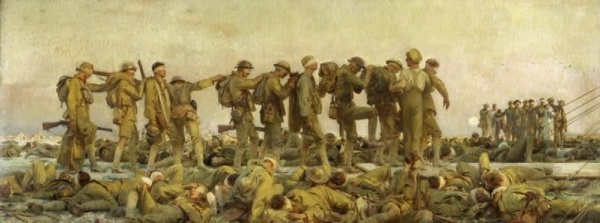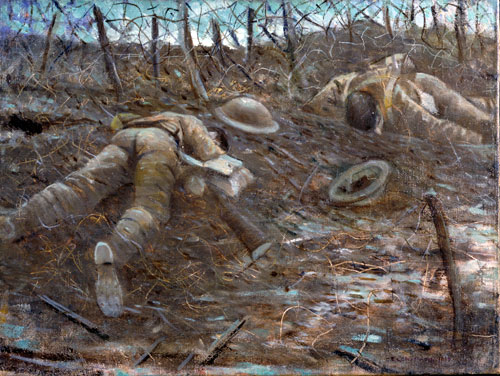Difference between revisions of "WW1"
m (→What really happened: add links) |
(update link) |
||
| (34 intermediate revisions by 2 users not shown) | |||
| Line 1: | Line 1: | ||
{{Event | {{Event | ||
| + | |wikipedia=https://en.wikipedia.org/wiki/World_War_I | ||
|constitutes=War | |constitutes=War | ||
| − | |ON | + | |ON constitutes=German aggression |
|start=28 July 1914 | |start=28 July 1914 | ||
| + | |locations=global | ||
|end=11 November 1918 | |end=11 November 1918 | ||
| − | |ON_causes= | + | |abbreviation=WWI, WW1 |
| − | |description=The "Great War". Perhaps 10 million killed. | + | |ON_causes=Franz Ferdinand/Assassination |
| − | | | + | |description=The "Great War" and the "War to End War". Perhaps 10 million killed. |
| + | |image_width=600px | ||
| + | |image=gassed.jpg | ||
| + | |spartacus=http://spartacus-educational.com/FWW.htm | ||
}} | }} | ||
| − | + | '''World War I''' was marketed for the masses as the "'''war to end all wars'''" or the '''Great War'''. | |
| − | |||
| − | == | + | ==Official Narrative== |
| − | + | The immediate proximate cause - the [[casus belli]] - was the [[assassination of Archduke Franz Ferdinand]] of Austria in Sarajevo by a young student, [[Gavrilo Princip]], acting in concert with a few other members of a small but (allegedly) isolated group of Bosnian Serb nationalist "[[lone nut]]s". The [[assassination]] provided a bellicose [[Germany]] with an excuse to support [[Austria Hungary]] in forcefully holding the [[Serbia]]n authorities to account, knowing that in doing so it would provoke [[France]], [[Russia]] and [[Britain]] beyond endurance. In other words, that Germany engineered events in order to to justify pre-planned military aggression and the subjugation of the rest of Europe - and in so doing, took everyone by surprise. Root causes of the war are said to have been German militarism, German expansionism, the Kaiser’s bombastic nature and ambitions, and the last straw: Germany’s invasion of innocent, neutral [[Belgium]]. | |
| − | + | ||
| − | + | ===Problems=== | |
| − | + | [[Gerry Docherty]] and [[James MacGregor]] argue that this official narrative is a deliberately concocted lie. While the sacrifice, heroism, the horrendous waste of life and the misery that ensued were and are all too real, the reasons why it all began and why it was prolonged beyond 1915 has been successfully covered up for a century. Britain, ''not'' Germany, was responsible for the war, they suggest, a truth so potentially damaging to the [[UK deep state]] that it had to be kept hidden at all costs.<ref>[[Document:Hidden History|Hidden History]]: The Secret Origins of the First World War. By Dr [[Gerry Docherty]] and [[James MacGregor]]. ISBN 978-1780576305 - From the introduction </ref> | |
| − | + | ||
| − | + | ==Background== | |
| + | The global dominance of the [[British Empire]] reached its zenith through the last quarter of the nineteenth century. That is the essential background to understanding how the war came about. Germany, with its growing industrial strength; its early exploitation and adoption of oil - especially for naval vessel propulsion; and its push for overland access to the newly discovered [[Middle-East]]ern oilfields, was viewed with increasing alarm by the ''[[deep state]]'' architects and arbiters of Empire, who began to develop secret plans and alliances to remove the threat. A ruinous war between Russia and Germany would be the optimum solution; failing that a wider war in which Germany would be crushed. | ||
| + | [[image:paths_of_glory.jpg|right|500px]] | ||
| − | == | + | ==Alternative Explanation== |
| − | + | A close-knit secretive group of unscrupulous men, whose roots and origins were in the UK, were intent on both defending and expanding Britain's existing imperial dominance of much of the world against actual or potential challenge. In the decade or so preceding war, Germany was seen as a serious looming challenge that would have to be dealt with. Vast personal fortunes were involved. The self-justifications of this group are expressed in the social philosophy of [[John Ruskin]] and propagandised in the stirring prose and [[poetry]] of [[Rudyard Kipling]]. The entire world was to be ruled, through the benign subjugation of lesser races, by an enlightened Anglo-Saxon empire whose functionaries were enjoined to "take up the [[White Man's burden]]". [[World War I/Key Players|This group of men]], organised and tasked in the manner of an elite secret society, deliberately sought and planned for war to crush Germany between France and Russia, and orchestrated events in order to bring this about. | |
| + | ==Legacy== | ||
| + | The horror of World War I cast a long shadow over the world. It inspired [[Salmon Levinson]] to work towards outlawing war. His ambitions were realised in [[1928]] with the signing of the [[Kellogg–Briand Pact]]. | ||
| + | {{SMWDocs}} | ||
==References== | ==References== | ||
<references/> | <references/> | ||
| − | |||
| − | |||
Latest revision as of 15:42, 26 April 2021
 | |
| Date | 28 July 1914 - 11 November 1918 |
|---|---|
| Location | global |
| Interest of | British War Propaganda Bureau, Charles August Lindbergh, Jim Macgregor, Hew Strachan |
| Abbreviation | WWI, WW1 |
| Subpage | •WW1/Commission for Relief in Belgium •WW1/Key Players •WW1/Origins |
| Description | The "Great War" and the "War to End War". Perhaps 10 million killed. |
World War I was marketed for the masses as the "war to end all wars" or the Great War.
Contents
Official Narrative
The immediate proximate cause - the casus belli - was the assassination of Archduke Franz Ferdinand of Austria in Sarajevo by a young student, Gavrilo Princip, acting in concert with a few other members of a small but (allegedly) isolated group of Bosnian Serb nationalist "lone nuts". The assassination provided a bellicose Germany with an excuse to support Austria Hungary in forcefully holding the Serbian authorities to account, knowing that in doing so it would provoke France, Russia and Britain beyond endurance. In other words, that Germany engineered events in order to to justify pre-planned military aggression and the subjugation of the rest of Europe - and in so doing, took everyone by surprise. Root causes of the war are said to have been German militarism, German expansionism, the Kaiser’s bombastic nature and ambitions, and the last straw: Germany’s invasion of innocent, neutral Belgium.
Problems
Gerry Docherty and James MacGregor argue that this official narrative is a deliberately concocted lie. While the sacrifice, heroism, the horrendous waste of life and the misery that ensued were and are all too real, the reasons why it all began and why it was prolonged beyond 1915 has been successfully covered up for a century. Britain, not Germany, was responsible for the war, they suggest, a truth so potentially damaging to the UK deep state that it had to be kept hidden at all costs.[1]
Background
The global dominance of the British Empire reached its zenith through the last quarter of the nineteenth century. That is the essential background to understanding how the war came about. Germany, with its growing industrial strength; its early exploitation and adoption of oil - especially for naval vessel propulsion; and its push for overland access to the newly discovered Middle-Eastern oilfields, was viewed with increasing alarm by the deep state architects and arbiters of Empire, who began to develop secret plans and alliances to remove the threat. A ruinous war between Russia and Germany would be the optimum solution; failing that a wider war in which Germany would be crushed.
Alternative Explanation
A close-knit secretive group of unscrupulous men, whose roots and origins were in the UK, were intent on both defending and expanding Britain's existing imperial dominance of much of the world against actual or potential challenge. In the decade or so preceding war, Germany was seen as a serious looming challenge that would have to be dealt with. Vast personal fortunes were involved. The self-justifications of this group are expressed in the social philosophy of John Ruskin and propagandised in the stirring prose and poetry of Rudyard Kipling. The entire world was to be ruled, through the benign subjugation of lesser races, by an enlightened Anglo-Saxon empire whose functionaries were enjoined to "take up the White Man's burden". This group of men, organised and tasked in the manner of an elite secret society, deliberately sought and planned for war to crush Germany between France and Russia, and orchestrated events in order to bring this about.
Legacy
The horror of World War I cast a long shadow over the world. It inspired Salmon Levinson to work towards outlawing war. His ambitions were realised in 1928 with the signing of the Kellogg–Briand Pact.
Related Documents
| Title | Type | Publication date | Author(s) | Description |
|---|---|---|---|---|
| Authors' Declaration of September 1914 | manifesto | September 1914 | British War Propaganda Bureau H. G. Wells Hilaire Belloc Rudyard Kipling Arthur Conan Doyle Arnold Bennett Thomas Hardy J.M. Barrie G.K. Chesterton John Galsworthy H.R. Haggard Jerome K. Jerome | An declaration in support of World War 1 by 53 leading British authors. One of the earliest efforts of the nascent War Propaganda Bureau to craft a coherent intellectual message in support of the war effort. |
| Document:Commission for the Relief of Belgium 1 | article | 5 August 2015 | Gerry Docherty Jim Macgregor | The organisation, promotion and diversion of Belgian 'relief funding' for the hidden but nonetheless express purpose of prolonging the war |
| Document:Commission for the Relief of Belgium 2 | article | 12 August 2015 | Gerry Docherty Jim Macgregor | The organisation, promotion and diversion of Belgian 'relief funding' for the hidden but nonetheless express purpose of prolonging WW1. |
| Document:Good war - Bad war | article | 12 February 2014 | John Pilger | A short readable expose of how the myth of the "Good War" is used by the Western Establishment to fashion our 'reality' - focussing on the largely forgotten devastation visited upon the Korean peninsular by the US and its victorious World War II allies. |
| Document:Hidden History - Concluding chapter | book extract | 4 July 2013 | Gerry Docherty Jim Macgregor | The concluding chapter of a seminal work of historical revision on the origins of World War I and 100 years of establishment lies to hide where responsibility really lies |
| Document:What We Need to Learn From TE Lawrence | book introduction | 25 March 2011 | Michael Korda | Michael Korda's introduction to his book "Hero: The Life and Legend of Lawrence of Arabia", a biography of TE Lawrence |
References
- ↑ Hidden History: The Secret Origins of the First World War. By Dr Gerry Docherty and James MacGregor. ISBN 978-1780576305 - From the introduction
